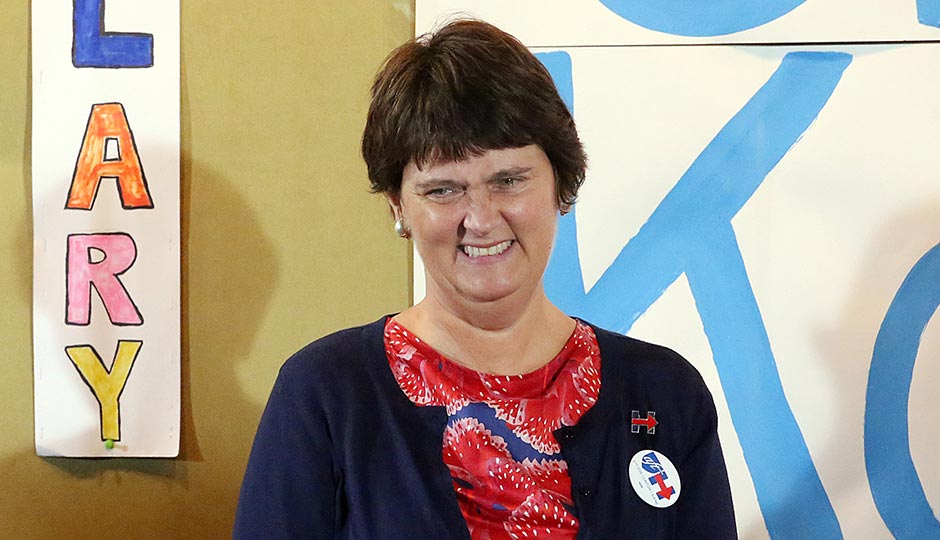Q&A: Anne Holton, Clinton Ally, on Education

Photo | Star Shooter/MediaPunch/IPX
Last Thursday, Democratic vice presidential candidate Tim Kaine stopped at Spring Garden Elementary School to stump for votes and brandish his education credentials. He was joined at the stop by American Federation of Teachers president Randi Weingarten.
Over the weekend, Anne Holton — a former judge and Kaine’s wife — was also in the Philadelphia area campaigning. She made stops in West Mount Airy, Ardmore, and West Chester.
Holton, a longtime child welfare advocate, was Virginia’s education secretary before resigning in July to spend time campaigning. She famously attended a historically black public school when her father, then-Virginia Gov. A. Linwood Holton, desegregated the schools in 1970. She and Kaine sent their three children to Richmond public schools.
She’s been an advocate for improving school performance by bringing people out of poverty, and has opposed charter school expansion and pushed for expanded professional development for teachers. That is part of Hillary Clinton’s education plan, as well.
Philadelphia magazine got a few minutes with Holton this weekend after her campaign stop at Ardmore. First, we asked her what she thought of the 2005 tape of Trump’s lewd, grope-y talk about women that was released on Friday afternoon. Here’s what she said:
The truth is that I try really hard not to talk about the other side because we’ve got so much good stuff to talk about Hillary Clinton, and education, and otherwise.
I can’t avoid saying something about it — it’s just so infuriating. I guess I’ll just say is that one of the most infuriating things about it … well, who I think he owes the most apology to is the voters. Because his insult-driven campaign has been such a distraction from the real issues. I was with these educators this morning, and what they want to talk about is, what are we going to do to improve our schools to make sure children from every ZIP code can have a successful chance at life. Voters everywhere want to talk about real issues, and the fact that his insult-driven campaign, the things he said about people from all different walks of life, that’s overridden important discussions between stark differences on so many issues. It’s just infuriating.
Then we got down to education. The Q&A has been lightly edited for style.
You were Virginia’s education secretary. What did the federal government do well when you were education secretary, and what could it improve on?
The discussion over the last decade, really, there has been a lot in education about getting the balance right between federal and local/state leadership, and getting the balance right on accountability. And I worked hard in Virginia, with our federal partners. Virginia was one of the states that was one of the very early adopters of standards-based education with high-stakes testing. We were actually there before the feds, we went farther. We have more tests, and longer tests.
I do think that this new law that was passed last year, the Every Student Succeeds Act, we’re turning much of the responsibility to the states. Which is a good thing — and yet, with the premise that the feds still do have a role to make sure education is working for everybody. I think getting that balance right is working. I think Hillary’s administration will work hard on getting that balance right.
I read about a national teacher of the year a few years ago who had a great line about “responsibility and delight can coexist in education.” [This appears to be Justin Minkel quoting author Philip Pullman.] We can have systems that provide necessary accountability and yet don’t squeeze out the joy of learning and the joy of teaching.
What, specifically, would you like to see the federal government do if Hillary Clinton wins the election?
Here’s an example of something that the feds have done that has been a good contribution over the last decade: We’ve systematized the graduation rate measure. So now we can really look to states: How are we doing on graduation rates? And we can compare apples to apples. And then we can see what’s working and what’s not and help share best practices, help learn from each other.
Hillary has proposed a number of significant roles that she would love to help carry forward in pre-K and K–12 education. Starting with pre-K: The federal government does have a traditional role in helping to direct equity, and one way to start on that is to start early. If we can get students, especially those who need it the most, high-quality pre-K education, then they can get off to a great start. It’s a proven winner. That’s an important role for the federal government.
It can also help invest in high-quality professional development for all teachers. Hillary has a proposal to have the federal government do that — and then to work with the states on how we modernize and elevate the teaching profession more generally. There are lots of opportunities. It’s a tricky thing, because local communities and states are rightly, and intimately, involved in education — so the federal government needs to be in a partnership and collaborative role.